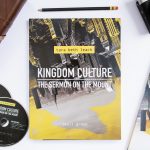“Oh, Pastor, I hope you aren’t worried. Attendance is always down in the summer. The numbers will go back up.”
It is summer, and I know that, but somehow a bad day of attendance can really bring a pastor down. And not only are we in the summer months, but my church has also been experiencing a decline for several years now. When the pastor I replaced left, membership dropped another 150, and then when I entered the scene, we lost even more over the gender issue. Decline and low numbers can make a pastor’s heart anxious. And I would be lying if I said it meant nothing to me. Numbers tend to be a big deal for pastors. Oftentimes, when I’m sitting with a group of pastors, someone almost always asks, “What’s the size of your congregation?”
When I began my ministry journey in the early 2000s as a Youth for Christ director, we used to compare attendance numbers in staff meetings and then high-five one another when attendance was “crushing it.” There’s hardly a pastor anywhere who would deny feelings of excitement when numbers are unusually high, or when the pastor glances out in the sanctuary and the seats are full. Needing to build bigger and more state-of-the-art sanctuaries can be a thrill, no doubt.
In my early days of ministry, I recall attending a church-growth summit, and as a young associate pastor, I sat there enamored of one pastor’s account of growing a church from sixty people to five hundred. I couldn’t take notes fast enough, and I couldn’t wait to someday apply the tactics I learned about that day. A quick scroll through Google can teach us all about the easy principles for church growth.
Yes, numbers tend to be quite the big deal for pastors. In fact, many pastors measure success based on the ABCs:
A:ttendance
B:uilding
C:ash
The ABCs are helpful for measurements, but when we wrongly prioritize them, they reflect the values of empire more than the values of the kingdom of God, and we risk missing out on the kingdom mission all together. As pastors, we have got to reorder success. We have to abandon the idea that we should be driven by numbers or warm bodies in the sanctuary.
When God called me to be a pastor at the age of sixteen, I yearned to see others run to Jesus; I yearned to see others being formed in Christ; I yearned to see the bride of Christ press in to the wild, untamable, and fresh Spirit of God. I never once dreamed about running to the ushers at the end of a Sunday to ask, “What were today’s numbers?” Instead, I dreamed about watching young and old fall in love with and be formed into the likeness of Jesus.
Ever since I sat at the feet of my mentor, friend, and professor Scot McKnight, I’ve been studying Jesus’s Sermon on the Mount in Matthew chapters 5–7. In it, Jesus paints a beautiful portrait of what the new people of God in Christ look like. If one wants to know the values and heartbeat of Jesus, read the Sermon on the Mount. Jesus’s words pierce the heart of the reader and demand us to actually press into his words and do what he says. At the center of his words, he is asking us—his bride, the church—to love like God loves; that is, to have a boundary-breaking, countercultural, inclusive, and indiscriminate love for all people. Jesus asks us to forgive like God forgives, to give like God gives, and to live a life that is radically oriented to God. By the end of the Sermon on the Mount, the reader should have a pretty good grasp of what the culture of the kingdom of God should look like—or, another way to put it, the reader should have a pretty good grasp of what the church in 2017 should look like.
In a world that is obsessed with measuring numbers, perhaps it is time to acknowledge that the metrics of the kingdom of God aren’t the same as that of the empire. Perhaps as pastors, we can refuse the shallow measurements of the empire and allow the teachings of Jesus to orient how we lead, teach, preach, pastor, make decisions, disciple, and even measure. Perhaps, instead of running to our ushers to get a head count, we ask:
Are our people seeking reconciliation with one another and in their neighborhoods?
Are our people making space at the table for others who aren’t like them?
Are our people being propelled by the Spirit to edify others with gifts and graces?
Are our people daily choosing to ruthlessly trust Jesus with their lives more than they trust their material possessions?
Are our people refusing a shallow gospel and instead choosing the long, difficult, and narrow road of discipleship?
Is Jesus the ultimate authority of our people’s lives? Are they living as though this is true?
Are our people propelled by the Spirit to step into the trenches and the margins and be midwives of peace, justice, healing, and reconciliation?
As a pastor, my heart yearns to see the good people of my local church, as well as the church universal, reflect and embody the very culture of the kingdom of God. Sure, there are going to be weeks when I end up worrying about attendance, building, and cash more than I should. But I pray that the in-breaking power of the kingdom of God and the resurrecting power of the Spirit would reorient this pastor’s heart of mine. Attendance, building, and cash will always matter to an extent, but let them not be the things for which we yearn; let them not be the things that orient how we pastor; let them not be the things that drive our decisions; let them not be the things about which we dream. God’s imagination is much bigger and wilder than that!
Instead, dear pastors, let us dream the things God dreams of, and let us reflect Jesus’s vision in the Sermon on the Mount.

Tara Beth Leach continues to unpack the context surrounding the Sermon on the Mount in Kingdom Culture, an 8-week small group study.





1 Comments
Bob Luhn
This is a great article by Pastor Leach! A kingdom mindset and Kingdom focus is crucial if we want to truly follow Jesus in the 21st century. When we narrowly focus on our local congregation, it tends to become all about my kingdom, not His. When we are Kingdom of God minded, we are open to whatever Jesus is up to in our neighborhoods, cities, or countries. We have the big picture in mind. If we